By KEVIN TAN, CHRISTINE CHEAH and DENIELLE LEONG
alltherage@thestar.com.my
FOR some young Malaysians, Ramadan isn’t just a time for spiritual reflection – it’s also a time to share their food with others.
More and more young people are setting up stalls at Ramadan bazaars to share their culinary creations – which range from traditional fare to completely new dishes – with fellow Malaysians.
And it’s not about the money either. Those we spoke to all talked about the joy of being able to be part of this wonderful Malaysian tradition. Here are some of their stories:
Crocking business
Zaidi Alamin Fuad, 30, normally runs a fried mushroom stall while his friends Haidir Razli, 31, and Sofian Hamid, 30, are dive instructors.
But for the past two years, they’ve been carrying huge make-shift crock pots to Ramadan bazaars to sell their special dish – ayam tempayan.
You can find their roasted chicken this Ramadan at the bazaars in Kelana Jaya, Selangor and Putrajaya, and what makes it so special is that they’re roasted in large clay garden pots.
“My friend saw someone else doing this back in his hometown in Kuantan, Pahang, and he suggested we bring it to KL,” said Zaidi.
With this technique, Zaidi said it takes just 30-40 minutes to cook a whole chicken.
At the Kelana Jaya bazaar, Haidir said they sell at least 100 birds a day. With such brisk business, it’s no wonder the friends are looking to expand their operations.
“We hope to open a restaurant and feature ayam tempayan as the main dish,” said Haidir.
Family affair
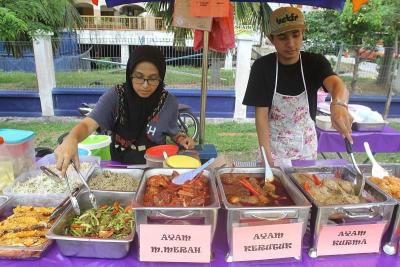
Edzna Suri Ismail sells her mother’s authentic Kelantanese cooking with the help of her brother-in-law Muhammad Idil Ilham.
A few months ago, Edzna Suri Ismail, who is from Kelantan, asked her mother to come stay with her throughout Ramadan at her current home in Petaling Jaya, so they could spend more time together.
But after visiting a nearby Ramadan bazaar, Edzna’s mother was surprised to find that there weren’t any stalls selling traditional Kelantanese food. And that’s when Edzna suggested they be the first.
They set up a tiny stall selling her mother’s signature Kelantanese dishes like ayam kurma, ayam keruntuk and ayam percik. Though they were operating from a very humble-looking stall, customers have been coming back for more.
“A lot of them have given us good feedback!” said Edzna with a laugh.
But for Edzna, making a profit from her bazaar business is secondary. What she and her mother really wanted to do was spread some joy through their food.
“Everything we sell is cooked by my mother, who makes everything exactly like how she does for us at home. We don’t leave out any ingredients, which is why we can only sell in small amounts,” she said.
Out of the kitchen
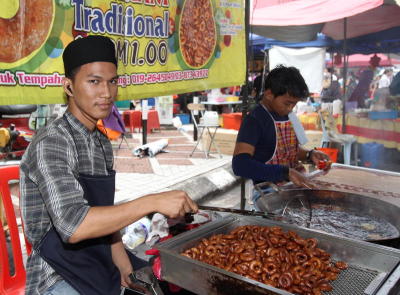
Malaccan chef Muhd Haqi is spending his Ramadan in Kuala Lumpur to gain more entrepreneurial experience.
Mohd Haqi, 20, took a month off from his day job as a chef in Malacca so he could try his hand at running his own Ramadan bazaar stall in Petaling Jaya.
Throughout Ramadan, Haqi will be selling rojak and kuih peneram at a bazaar in Taman Tun Dr Ismail. So far, the experience has been refreshing for him.
“It’s different from working in a kitchen, where things can get a bit boring because you’re confined in that small space all day. It’s so different being in this environment now. It’s a new experience,” he said.
Haqi hopes to use this experience as preparation to open his own restaurant in Malacca some day.
“Working under a boss is very different from doing your own business, because you have a fixed salary. When you’re running your own business, you feel it every time you make a profit or loss,” he said.
On the other hand, for siblings Abdul Mustaqim, 19, and Fatin Nur Liyana, 21, and their cousin Mohd Al-Amin Aizat, 19, working at Ramadan bazaars is something of a family tradition. This will be their ninth year selling the family’s homemade cookies and kuih during Ramadan.
As their family only runs the business during Ramadan, this serves as an opportunity for them to earn some side income, and also learn the tricks of the trade.
Mustaqim and Aizat, both hospitality students in college, find that the business helps them gain first-hand experience of what customer service is like.
The three would head straight to the bazaar after classes to assist their parents in setting up the stall.
Similarly, Haqi said managing his business has also helped him practise good discipline and time management.
“As a chef in Malacca, I only start work at 3pm. But now, I have to wake up early in the morning around 6:30am to prepare the food,” he said.
Kuih-zy business
For over a decade, Nuriza Syamsurizal has been selling Malay traditional kuih at Ramadan bazaars with her family. Now that she’s older, the 22-year-old fresh graduate is handling her own stall – with the help of teens from her neighbourhood – in Jalan Telawi, Bangsar.
Her brother Muhammad Iqbal, 20, runs another stall at the same bazaar while the rest of the family would man another in Desa Pandan, KL.
“My mother and some of the makcik-makcik from our neighbourhood supply us with kuih daily. All we have to do is sell them, and the profit is ours to keep,” said Nuriza.
They sell 100 types of kuih, and they have received an encouraging response from the public, with tepung pelita being the best-seller.
“People tend to look for something sweet to buka puasa before performing their Maghrib prayer, and that’s why our kuih have sold so well,” said Nuriza, adding that the business is also a great way to earn extra income.
However, she doesn’t intend to keep all the money. “I want to share it with my family, and I will also donate some to the mosque.”
Foreign favourites
Ahmad Mujahid Hayatul Kamil, known simply as Mooj among his friends, is bringing some Western flare to the Ramadan festivities with his meat skewers, a recipe he invented himself.
He got the idea a few years ago while he was studying Food Service Management at UiTM Penang. He used to help out at his lecturer’s food stall which sold something called kebab cucuk.
Mooj then took the idea and gave it his own twist, turning them into mouth-watering skewers which he would sell at night markets in Bangi and Cheras in KL.
He would later on work on a ship as a cook for about a year, but when he came back, he started something new again.
He started the Mooj Skewer & Western “mobile kitchen”, which saw plenty of business from his old customers.
At Ramadan bazaars, however, Mooj only operates a regular stall, not the mobile kitchen. Even then, he still sells about 400 skewers a day.
“When I first started, I had to sell traditional Malay dishes along with my own recipes, because I knew people wouldn’t respond well immediately to new things. But now that people know my food, I don’t need to do that any more.”

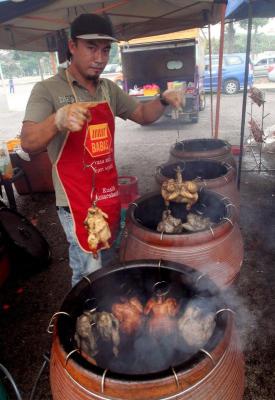
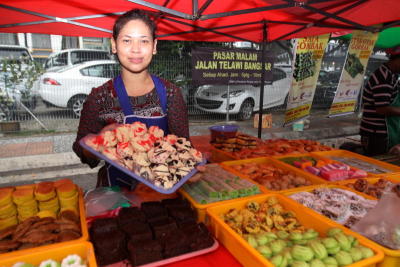
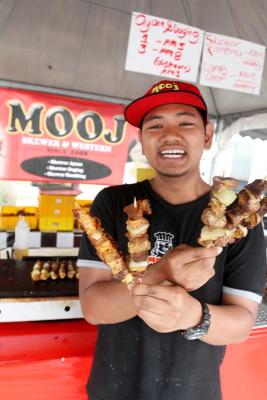
Leave a reply